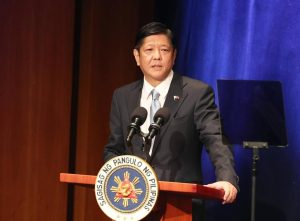Philippine President Ferdinand Marcos Jr. yesterday said that his government will turn to the United States to fill a canceled shipment of Russian military heavy-lift helicopters. The Philippine leader said that he supported the decision of his predecessor Rodrigo Duterte to scrap the 12.7 billion peso ($215 million) contract to acquire Mi-17 helicopters, due to fears of possible Western sanctions.
“I think it has already been determined. It was already determined by the previous administration that that deal will not carry through, will not go on,” Marcos told reporters, according to a statement from his press secretary’s office. “The deal with Russia was for some heavy-lift helicopters and now we have secured an alternative supplier from the United States.” Marcos said that the choppers would be manufactured by a Polish contractor, but did not elaborate.
Duterte signed the deal to buy the Mi-17 helicopters last November, and a down payment on the shipment was made in January of this year. In the immediate aftermath of the Russian invasion of Ukraine, the Philippine defense secretary said that the country had no plans to cancel the acquisition, but in the final weeks of his term, with Russia under intensifying pressure from the U.S. and its Western partners, Duterte opted to scrap the deal.
As Jose Manuel Romualdez, the Philippine ambassador to the U.S. told The Associated Press at the time, Manila was concerned that Western sanctions might include restrictions that would slow down transfers of remittances from Filipino workers abroad, which made up an amazing 9.6 percent of the country’s gross domestic product in 2020.
Marcos’ remarks followed a request from the Russian government that Manila honor the contract. According to The Associated Press, Moscow’s ambassador to Manila, Marat Pavlov, told reporters Wednesday night that the Philippine government has not officially notified Russia of its decision to cancel the deal and that Russia’s Sovtechnoexport was proceeding to manufacture the Mi-17 helicopters.
He said that the Russian aircraft manufacturer was ready to deliver one of the helicopters in June “but unfortunately, it was not accepted by your government.”(Earlier reports claimed that the first batch of chapters would not be delivered until 2024.) “We are ready to fulfill all our obligations as a reliable partner of the Philippine side in the field of technical military cooperation and we consider that it will also be done by the Philippines,” Pavlov said.
While saying that the decision to cancel the helicopter contract was not reversible, Marcos said that his administration was “hoping to negotiate to get at least a percentage of that back.”
The substitution of the Russian purchase with an American one can partly be explained by the impact of the war in Ukraine, and Russia’s subsequently growing isolation from the U.S. and its allies and partners. But it also offers the latest sign that the Marcos administration has set about recalibrating the Philippines’ foreign policy, after six years in which Duterte had wrenched the country away from the U.S., its long-time security ally, and embraced both China and Russia.
While it stops short of a lock-step alignment with the U.S. in every domain – China remains an important economic partner with whom Marcos has expressed a desire for fruitful relations – the new government has reverted to the historical mean of friendly relations with Washington.

































